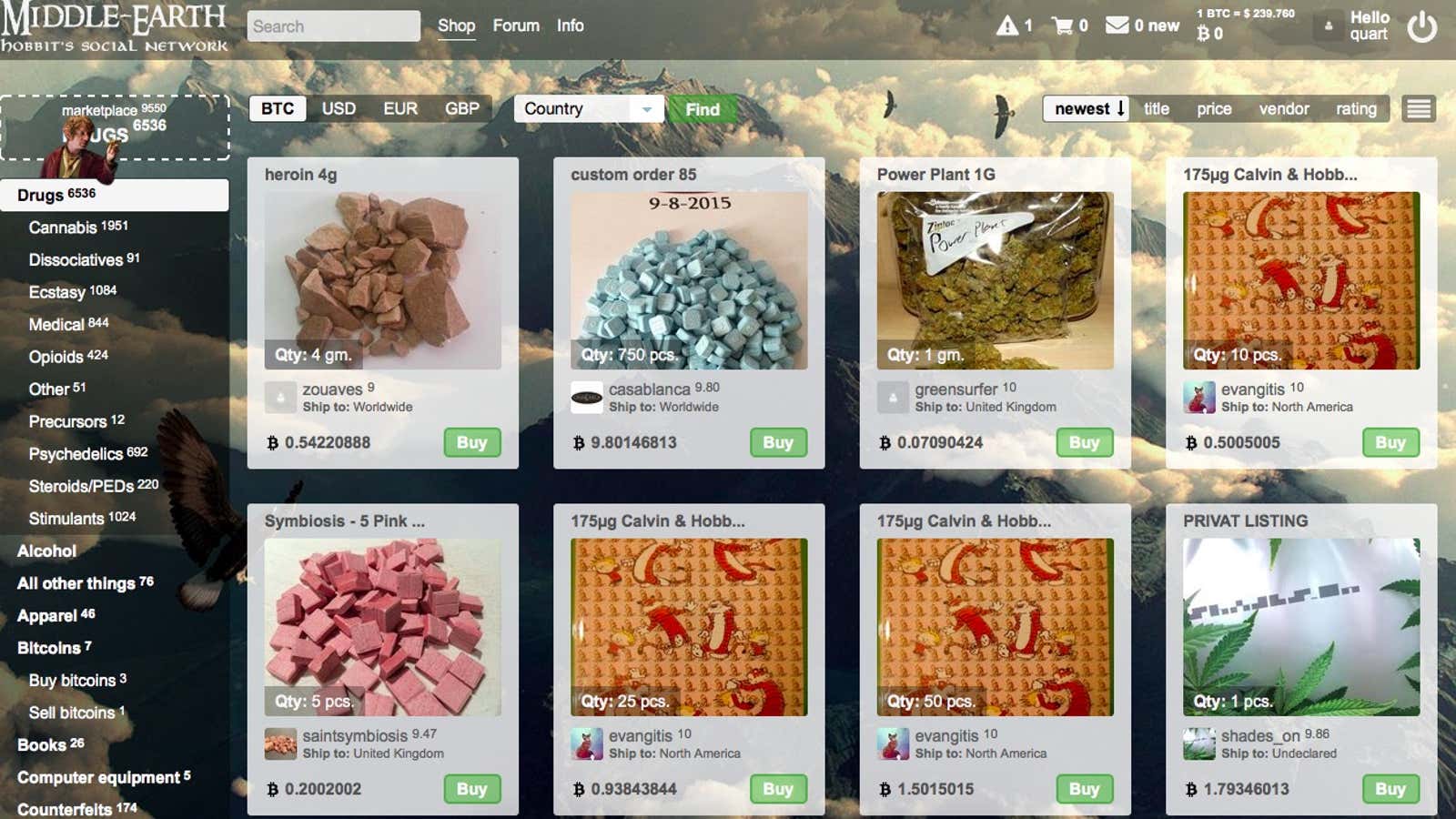This article has been corrected.
We had met at a bar. I told him I was an economist. He told me he was a pot dealer. You might think we wouldn’t have had much to talk about. But the most exciting story in economics is one where an innovation disrupts a market and creates new ones. So once he said the “dark web” had totally changed his business model in just a few years, I knew he could tell me things that would really blow my mind.
The dealer, Paul (not his real name), explained how much easier it is to do business if he orders his supply over the web. In some ways, it’s safer—he can buy a wider range of cannabis, gets more consistent quality, doesn’t have to personally interact with his suppliers, and it’s quick and easy. But getting large amounts of marijuana shipped to him through the mail remains a major source of risk. To minimize it he employs a third party—a facilitator—to handle the delivery.
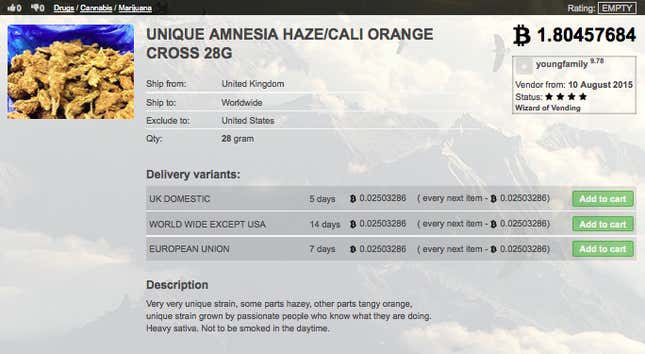
The facilitator rents a carefully vetted Airbnb and arranges for a naive student to be there to sign for the package. The student then takes it to a second location, often a convenience store where the facilitator has a relationship with the owner. He collects the package from there, splits it into smaller portions, and passes those on to street dealers for sale. For taking on the most risk, the facilitator gets 60% of Paul’s profits.
That 60% got my attention. After all, the market for drugs is notoriously inefficient. Street dealers, who face the most risk of violence and arrest, aren’t compensated for it. But in Paul’s model, the biggest risk-taker was the facilitator, and he was getting the biggest share of the profits, just as economic theory said he should. If what Paul told me was true, I wondered, could the dark web be creating a better functioning and more efficient drug market?
What is the dark web and how does it work?
Marketplaces for contraband have existed for only about four years on the dark web, but they’ve made inroads fast. According to the 2015 Global Drug Survey, about 10%-15% of drug users in the UK, US, and Australia have bought drugs off the net.
These sites don’t show up in search engines and can’t be visited with a regular web browser. You need special software that will obscure the site’s location on the internet (its IP address) and, generally, yours too. For many dark-web sites, that software is Tor, originally developed by the US government to protect intelligence information. And most of the sites conduct business in bitcoin, the cryptocurrency that allows for anonymous online payments.
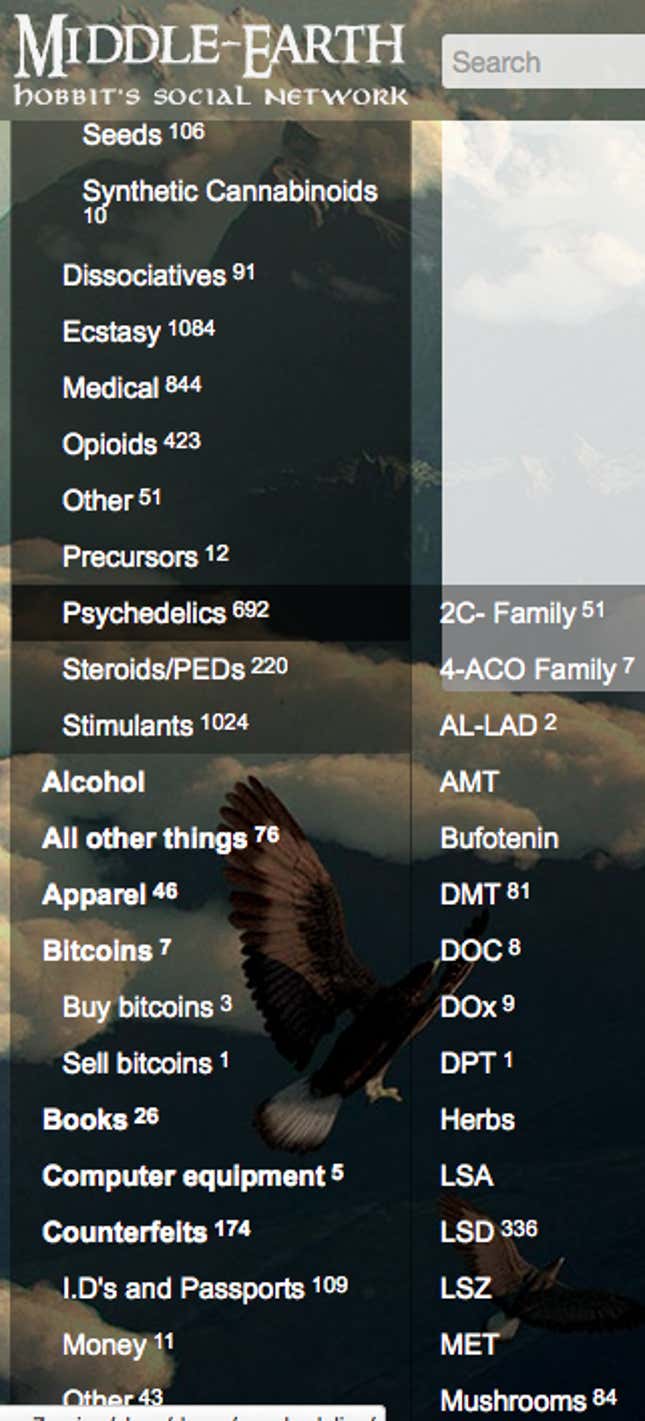
“It was the combination of Tor and bitcoin” that sparked the sudden growth of these drug marketplaces, says Nicolas Christin of Carnegie Mellon University, an expert on the dark web. People may have previously bought or advertised drugs on non-dark websites like Craigslist, he said, but it was a tiny share of the market, with unsophisticated sellers and buyers.
Silk Road, founded by Ross Ulbricht (a.k.a. “Dread Pirate Roberts”) in February 2011, was the first site to marry Tor and bitcoin to create a bazaar of illegal goods. By the time Silk Road was shut down in October 2013, about 1,000 vendors were selling on the site. Since it shuttered, dozens of new bazaars have sprung up in its place, offering an exhilarating and terrifying array of products: prescription pills, meth, heroin, speed, crack, guns, stolen identities, gold, and erotica.
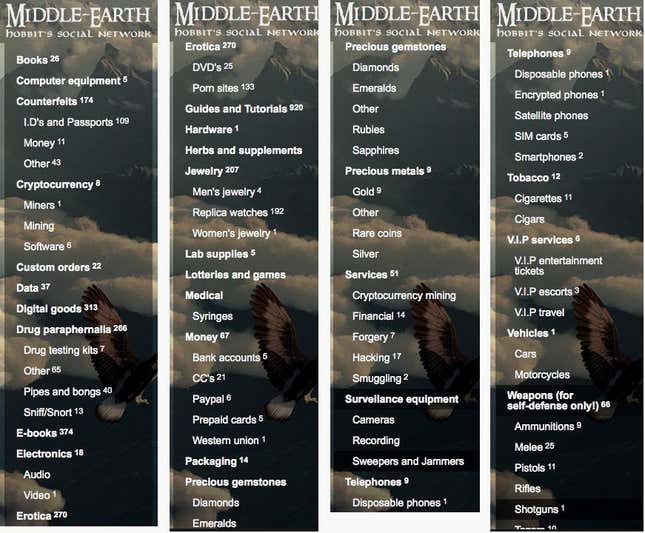
Shopping on the dark web is easy. Tor works much like a conventional web browser. You simply download it, open it, search for the name of an active market (some require a referral), choose one, create a login, and you are ready to go.
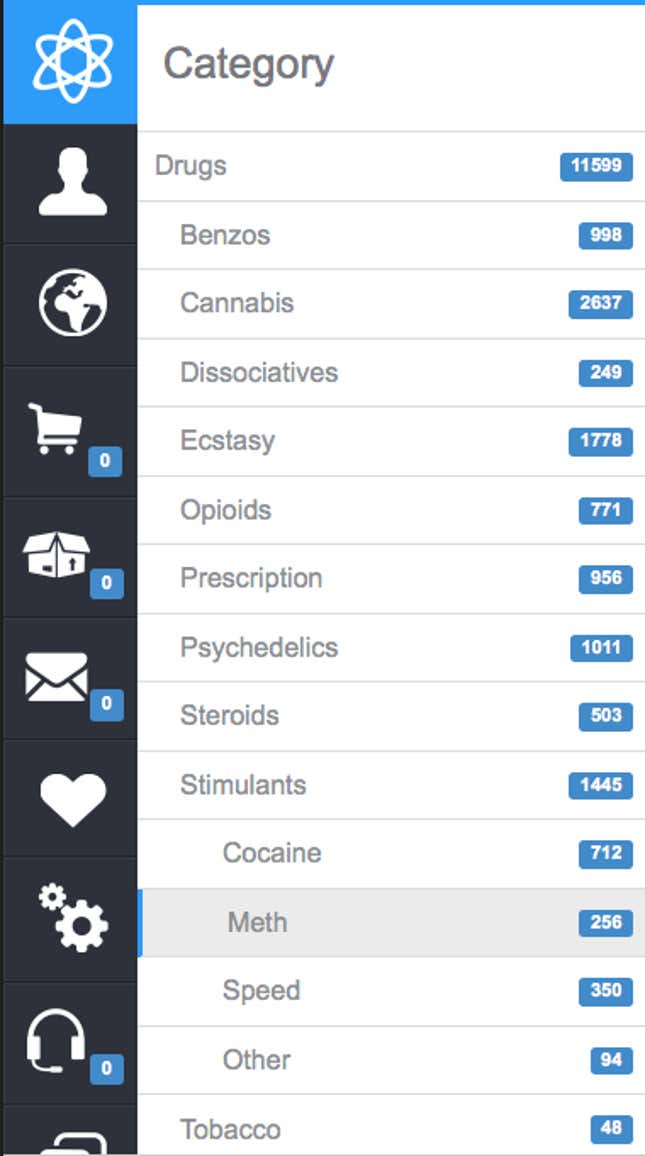
And aside from their wares, these marketplaces look remarkably similar to their counterparts on the “clearnet”, or regular internet. Users leave detailed reviews on the quality of a vendor’s product, speed of delivery, and how secure the shipping method was. There’s information on where vendors are located and where they’ll ship to. Some even post their refund and exchange policies. The websites are clean, well organized, and easy to navigate; there are icons for online support, shopping carts, and order status. The bitcoin/dollar/euro exchange rate is often featured on a banner, much like a price ticker on a finance website. Purchasing meth from a dealer in the Netherlands feels as familiar and mundane as buying sheets from Macy’s.
Christin estimates there are about 9,300 different vendors on the dark web. He and his coauthor, Kyle Soska, recently scraped data (pdf) on transactions and prices from 35 different drug bazaars between 2013 to 2015, in order to see how the market had evolved post-Silk Road.
They observed that most vendors are casual dealers, selling relatively small amounts, and spend only a few months on a site. About 70% of vendors sold less than $1,000 worth of product in the period they surveyed. Only about 2% sold more than $100,000, and just 35 kingpin vendors sold over $1 million. The top 1% accounted for 51.5% of all the transactions. Despite the variety of things on offer, cocaine, MDMA, and cannabis made up about 70% of sales; and while most listings were for cannabis-related products, an overwhelming majority of the revenue came from selling MDMA and cocaine.
Where the risk still lies
The dark web does make transactions safer. Thanks to the ratings systems, the product is more reliable and both sides are accountable. You can deal anonymously, and you don’t have to meet potentially dangerous clients or vendors in person.
All the same, of course, there are risks that Macy’s customers don’t run. Because there’s no legal protection for illegal purchases, the bitcoin payments sit in escrow until the goods have been delivered and both parties are satisfied. That exposes the seller to exchange-rate risk, because bitcoin is an extremely volatile currency.
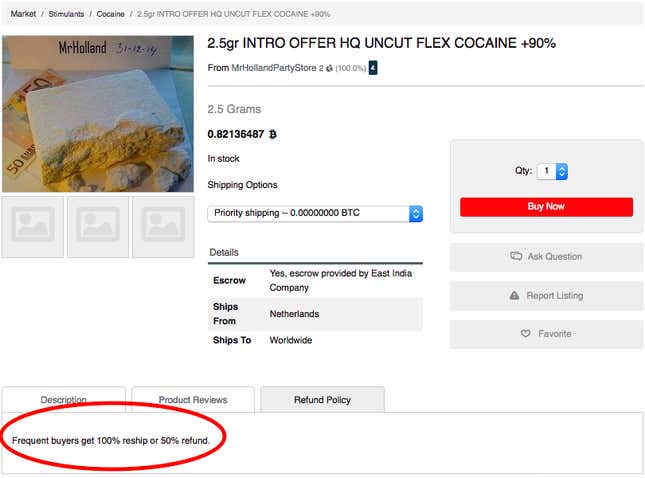
The original Silk Road offered a crude currency-risk hedging option, but most bazaars today don’t. Vendors are reduced to swapping even cruder hedging strategies on Reddit. A moderator of the popular Reddit DarkNetMarket forum, whose handle is Theeconomist1, wrote to me, “Escrow is obviously a big risk vendors undertake. Especially on certain products with thin margins. A fluctuation can easily wipe out a profit.” There is also, Christin says, a non-trivial risk a marketplace will abruptly shut down and its operators will steal the money sitting in escrow.
Finally, of course, there is one other big source of risk: the point where the virtual world of the dark web and the world of physical reality intersect. In other words, getting drugs delivered.
That’s why Paul, the dealer I met, gives up 60% of his profits to hedge delivery risk. Another Reddit user, VIadthePutin, described an equally ornate strategy to secure a safe delivery location (called a drop address):
“A drop address needs to be created, cultivated even. A quick run through on how I pick some of my drops:
I pick a house with no one living in it (but not bank owned)
Make it look lived in, including mow the lawn, weed the garden, maybe throw a kids toy out there.
Stop by every day or two for at least a week, preferably two or three. You want the neighbors to have a vague notion of someone living there without being able to pick out your face.
Get the mail man used to mail coming here, send junk mail to this address (This is where you pick the delivery name) cheap packages, whatever. Be mindful that Amazon mails through UPS and the USPS man won’t know if you’ve had packages delivered. *I stop by every day and put the mail on the counter inside the house, waiting a few days before opening just to allow LEOs [law-enforcement officers] to jump the gun on me.”
VIadthePutin says he works in property management. That makes it feasible for him to cultivate abandoned houses as drug delivery destinations. Most buyers just have the drugs shipped to their homes (especially if it’s a small amount) or to a friend’s house or PO box. A Quartz summer intern said that at his university, different frat houses had agreements to receive each other’s drug shipments.
How the dark web could change the drug market…
As with many illegal commodities, the drug market does not function efficiently. According to UN data (and as Quartz has previously reported), huge price disparities exist across borders. Cocaine, for instance, typically costs $63 a gram in the UK and more than $130 in Sweden. There can be large disparities in price within the same country or even the same city. A wide variation in purity is one reason, but so is an ill-functioning market. If drugs were a legal commodity, those price differences would be arbitraged away through trade.
The root cause of this market inefficiency is information asymmetry. You don’t know how good an illegal drug is until you consume it, and you can’t turn to the law to enforce agreements, return a substandard product, or complain to your dealer if he tries to rob you. That prevents price discovery and risk compensation, key features of a well-functioning market.
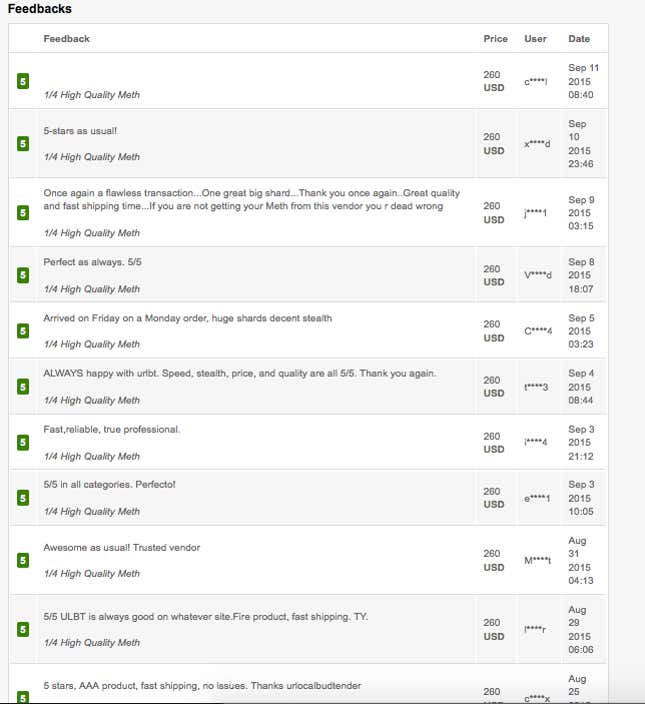
What makes the dark web a game-changer is that it has those features. Suppliers have detailed reviews on their product, the market is competitive, and people can shop around easily. Aspiring sellers struggle to get a foothold without a history of good reviews; sometimes they offer special deals and an easy exchange policy in return for good reviews. And the markets are global, so it’s possible to see prices in other countries. All this produces a well-behaved price distribution like the one you’d find in any functional, legal market.
Well, almost. TheEconomist1 has noticed that some international pricing disparities persist, because shipping internationally is so risky. Many vendors will only ship domestically. He wrote to me:
“The most obvious example is Australia. Their customs is so good and strict, drug loss via shipping is huge. Prices are hugely divergent from the norm. It could be 5-10 times more than prices found elsewhere.”
But there is already some evidence that the dark web’s competitive market is driving down prices. The median price for cannabis today on the dark web is only $7.60 a gram in the US/Canada, which is about 45% lower than what the street price was in 2013, according to UN data. Synthetic drugs are harder to compare in price than cannabis, because of differences in purity. On the dark web vendors are likely to be more up-front about the purity of their product, because the system holds them accountable.
…but only certain parts of it
At Ulbricht’s trial, his lawyers argued the dark web made drug dealing safer. Others argued it could make the industry less violent. At the very least it could make the market more efficient. But for it to reduce most of the violence and other risks in the drug trade, the dark web would need to reach a larger market. And despite its impressive growth, both TheEconomist1 and Christin agree that probably won’t happen. Christin says the market’s exponential growth rate is starting to slow as it converges on its natural, relatively small, size.
The market is limited in the kinds of buyers it can attract. With few exceptions, it cannot serve large distributors, who do not benefit from buying or selling on the web because they have their own existing relationships, methods of quality control, and so on. Delivery of large shipments is also a problem: Christin points out that some dealers have used unwitting commercial courier services such as DHL, but, he says, “It’s very hard to ship large amounts of drugs and not get caught.” Instead, most buyers on the dark web are either consumers, who use the web as an alternative to buying on the street, or fairly small-time street dealers.
The market is also limited in the kinds of drugs it can trade effectively. Drugs like heroin and cocaine already have established distribution and production channels that the web in its current form can’t disrupt. Opium poppies and coca leaves are grown in only a few developing countries, and turning those commodities into consumable drugs, transporting them, and distributing them is the domain of large, well-organized, powerful and very profitable cartels who, so far, don’t benefit from participating in dark web markets.
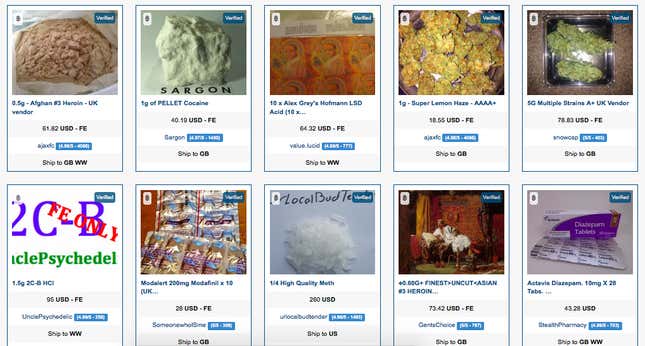
But according to the Theeconomist1, “Certain drugs are prime for bulk orders for distro [distribution].” He explains that RC (LSD), alp powder (Xanax) and MDMA thrive on the web because because vendors can participate in their production, and they are easy to ship in bulk. Theeconomist1 speculates that vendors for RC and possibly alp buy the chemicals overseas (often from China), press them into pills, and then sell the final (or intermediate product) on the web.
The vendors’ role in production may be what drives the relatively high margins on these drugs. It would also explain why, according to the Global Drug Survey and Christin’s research, they are the largest share of the dark-web market. The nature of these particular drugs and their relatively tech-savvy customer base could mean their sales move from being mainly street-based to being mainly online.
For other sorts of drugs, such as pharmaceuticals, the dark web will not work as a distribution channel for dealers, Theeconomist1 explained to me:
“No way can you buy adderal, oxy, etc on the DNMs [dark net markets] and resell for a profit. Often the street price is better than the DNM price. So for these types of drugs, its going to be mostly end users on the DNMs. This is mainly due to the how these drugs have to be sourced… You have to find a break in the supply chain. Smaller DNM vendors probably buy scripts [prescriptions] off patients, using pill mills as their source. Larger, more sophisticated vendors, find a way to pinch it higher up in the supply chain. Diversion at the suppply chain level is the only way to stock huge quantities.”
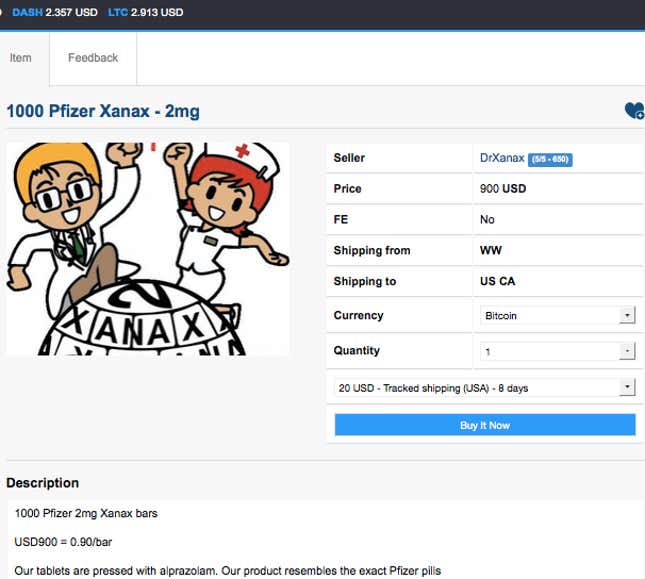
Similarly, the dark web is ill-suited to drugs like heroin or meth, whose heavily addicted users usually can’t wait the relatively long times—often weeks—it takes from purchase to delivery, nor have the mental energy to deal with bitcoins.
Drugs used by students and more affluent people are a more natural fit. Quartz’s intern claimed many drugs at his university were sourced on the web. When I was in college, most students bought recreational drugs from fellow students who were both bold and industrious enough to interact with real drug dealers. But the extent of their dealing was limited to other students and not very profitable. Now that kid down the hall who deals drugs may get his supply online instead of braving the in-person market.
The future
In short, the web will probably not alter the entire market. At most it will further segment it. Certain drugs like MDMA may move mostly online. And the web may be the preferred source for affluent users and small-time pot dealers.
Prostitution went through a similar transition in the early 2000s. Most sex workers in the middle and high end of the range no longer work with pimps or madams, because they can advertise for themselves online. This increased the number of providers and lowered prices. But at the lower end (streetwalkers) and the very high end (escorts), the market still functions more or less as it has for millennia.
Still, the dark web’s present size reflects the current state of technology. New innovation normally catches on with more affluent and sophisticated users first, then trickles down as it becomes more user-friendly. It was hard to imagine the widespread use of smartphones when mobile phones were only used by Wall Street types in the 1980s. Likewise, we cannot predict how the dark web will evolve. If drones, already being used by drug dealers, become more common, it may mitigate shipping risk. Payment technology and mobile could also evolve in ways we can’t predict. In that case even your average junkie may end up using the web, and your neighbor may be running a cartel one day.
Correction: An earlier version of this piece said the price of cocaine in the UK was $63 an ounce, rather than a gram.




